
In 1968, Michele Fairchild Marko, ’72, arrived at Buffalo State from Long Island, New York, bursting with creativity and ambition. The eldest of five and first in her family to attend college, Fairchild Marko excelled in science and majored in secondary science education. However, she recalls being unfocused and uncertain of her career goals.
It wasn’t until the fall of her junior year, when she crossed the ocean and immersed herself in another culture, that Fairchild Marko discovered the career she wanted to pursue. While living with a host family in Italy as part of Buffalo State’s Siena Program, she discovered a love of food and was intrigued with its relationship to a culture.
“I looked at the mother in the family, a simple woman with no education, and her attitude toward cooking,” Fairchild Marko recalled during a recent visit to Buffalo State. “I saw where science and food became art—from the shopping at the market to the presentation/pairing with the wine selection.”
The experience inspired her to embark on an independent study on food mores and to question if there was a career somewhere in there for her. To find out, when she returned to campus she enrolled in Buffalo State’s food and nutrition program (now dietetics and nutrition).
“The faculty wasn’t teaching in theoretical and esoteric ways,” she said, “but in ways that prepared us for the real world, which was complementary to my learning style.”
The experience also set the groundwork for graduate school and an impressive career that included stints as chief clinical dietitian for the Memorial Sloan-Kettering Cancer Center; associate director of clinical nutrition and director of the dietetic internship at Yale New Haven Hospital; instructor at Yale University; and regional vice president in the Midwest for the Compass Group, a position that entailed overseeing more than 1,000 food and nutrition employees in multiple states.
In 1995, she earned the advanced level credential of fellow awarded by the Commission on Dietetic Registration, a title held by only 350 dietitians out of the approximately 75,000 in the country. In 2007, she received the “Medallion” from the Academy of Nutrition and Dietetics for her service to the profession. Since 1976, the academy has honored 252 members who have demonstrated dedication to the high standards of the dietetics profession through active participation, leadership, and devotion to serving others in dietetics and allied health fields.
“Siena was a transformative experience,” Fairchild Marko said. In addition to changing her major, the study abroad experience caused her to view all her courses with a newfound appreciation and interest.
“Everything seemed richer,” she said. “If I hadn’t gone to Siena, I wouldn’t have looked at the world and my coursework with such a critical eye,”
To enable future Buffalo State students to have a similar transformative experience, she made a planned gift of $650,000 to the Siena Program, the oldest study-abroad program in the SUNY system. The gift will establish the Michele Fairchild Marko Siena Scholarship Fund.
“For students who are facing the same kind of financial challenges I had, I want to cover the tuition and the travel costs,” she said.
Due to her gift, at least one additional student a year who otherwise would not be able to afford the Siena experience will be able to go, said Robert Summers, assistant dean for international and exchange programs.
“It is just tremendous,” he said.
Fairchild Marko’s generosity doesn’t stop with Siena, however. She and her husband, Tedy B. Marko, also are making a planned gift of $1.5 million to the International Center for Studies in Creativity (ICSC). This marks one of the largest individual gifts to the college, and it will enable the ICSC to establish an endowed chair.
“We are extremely grateful to Michele for recognizing the gem that is the ICSC and for making such a remarkable and generous gift that will raise the program’s profile both in the United States and in the international community,” said Susanne Bair, vice president for institutional advancement. “The fact that we can create an endowed chair for the center is significant.”
Although she didn’t take creativity courses while a student, Fairchild Marko became enamored with the program in recent years after perusing courses online and reading the academic writings of Gerard Puccio, professor and director of the ICSC.
In June, she attended the ICSC’s 14th annual Creativity Expert Exchange, which attracted approximately 100 participants. She described the experience as invigorating and thought-provoking.
Since 1967, the center has trained students, groups, teams, and organizations to become more effective creative thinkers and problem-solvers. Over the past two years, Puccio and the ICSC have been included in national news stories on the importance of brainstorming and creativity in the business world.
“I realized that Gerard’s philosophy is what I have employed my entire career and what I attribute to my success,” she said. “What I learned through trial and error, Buffalo State was developing into a whole program.”
